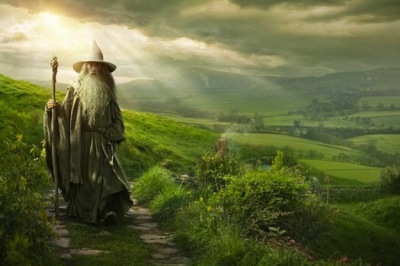'The Hobbit' Movie Review: A Wondrous Journey Well Worth Taking

"True courage is not about knowing when to take a life, but when to spare one." – Gandalf the Grey
CP Rating: 4.5 out of 5 stars
Nine years since the last "Lord of the Rings" movie graced the big screen, "The Hobbit: An Unexpected Journey" brings back the magic and splendor of J. R. R. Tolkien's fantasy world to life in an adventure that is well worth taking.
It is no easy task following up on what many consider to be the greatest film trilogy ever made, backed by tremendous box office success, but "The Hobbit" manages to entertain, amaze and inspire in many of the same ways the first three "Lord of the Rings" movies did. However, viewers unfamiliar with the books need to be aware that as a prequel, "The Hobbit" features a smaller, narrower story, the beginning of the journey; and that it is missing the grand war spectacle delivered in the first trilogy, along with the emotional punch that came with it.
"An Unexpected Journey" is the first part in director Peter Jackson's new "Hobbit" trilogy, with the other two movies set to be released in 2013 and 2014. Many fans were surprised and unsure about the decision to split the story into three parts when it was first announced, given that Tolkien's 1937 book The Hobbit is only 300 pages long and is much more of a children's book than the larger series. Both fans and newcomers to the movies can rest assured, however, that Jackson succeeds wonderfully in blending the more light-hearted and at times silly qualities of The Hobbit with the dark prelude to the rising power of Sauron, the primary antagonist of the Lord of the Rings saga.
Even with that in mind, it is understandable that some viewers may feel a little bit underwhelmed to go from the sweeping battles and grandiose settings of the trilogy to the quieter, more humble beginnings of "The Hobbit". As the story takes place years before "The Fellowship of the Ring", many of the trilogy's beloved characters are absent from "An Unexpected Journey" — although some of them do make interesting, albeit brief appearances that should delight fans.
Instead, a brave group of 13 dwarves make up "The Hobbit's" primary characters, along with Gandalf and the new trilogy's main protagonist, the hobbit Bilbo Baggins. The dwarves set on a mission to reclaim their fortress home in the Lonely Mountain, which is guarded by the fearsome dragon Smaug. They believe that Bilbo, albeit reluctant to join them at first, may be their best chance of finding a way through the treacherous mountains.
Sir Ian McKellan is once again brilliant as the grey wizard, returning to the character's more personable roots before his ascension to Gandalf the White in "The Two Towers". With a staff, a sword, and a more youthful step, he also gets to charge head-first in quite a few more battles than in the trilogy — but still enriches the heroes with pearls of wisdom and reflection during the film's quieter moments.
The hardy band of dwarves and Bilbo's self-aware quips make for a more humorous and light-hearted adventure than the original trilogy, but when things need to get serious, they do. With plenty of orks, goblins and trolls along the way, fearsome battles, bloodshed and beheadings ensue that test the limits of the PG-13 rating in some parts. While fans may miss the grand-scale charges and thousands-strong armies of "The Lord of the Rings", there is plenty of action and adventure in the film that lives up to and even exceeds expectations.
Unlike the original trilogy, "The Hobbit" is shot with 3D technology with the never-before used 48 frames per second projection, which undeniably changes the viewing experience. Reviewers may argue about whether this is for better or worse, but ultimately it depends on each viewer's personal preference — and moviegoers can watch it in standard format as well. For the most part, however, 3D benefits the film, especially when it comes to drawing the viewer into the intense battle scenes and making him/her feel as if they are walking alongside Gandalf and his band as they journey through the majestic splendor of Middle-earth's valleys, fields, forests, mountains and summits, filmed in the breathtakingly beautiful landscape of New Zealand.
Praise must also be shared for the film's musical score, composed by Howard Shore, who also took charge of "The Lord of the Rings" trilogy. The Canadian composer uses familiar themes from the last movies as the basis of the score, but enriches it and adds new material to create another masterpiece that anoints the ethereal, at times gentle, at times stirring glory of Tolkien's world.
At a running time of two hours and fifty minutes, some viewers may find that "The Hobbit" lags a little bit in certain parts when the focus falls heavily on meetings and gatherings centered on Middle-earth's history and mythos. The story deserves to take it's time, however, and the entire experience is more than worth it at the end. Having read or seen "The Lord of the Rings" trilogy is not a necessity to follow the story, but it helps one to appreciate it all the more. As should be expected by a prequel, "An Unexpected Journey" does not reach the unparalleled heights of the first trilogy, but it is a movie well worth seeing, and certain to be remembered as one of the year's best.
"The Hobbit: An Unexpected Journey", produced by New Line Cinema, Metro-Goldwyn-Mayer (MGM) and WingNut Films, will be released to the general public on Friday, Dec. 14.





























